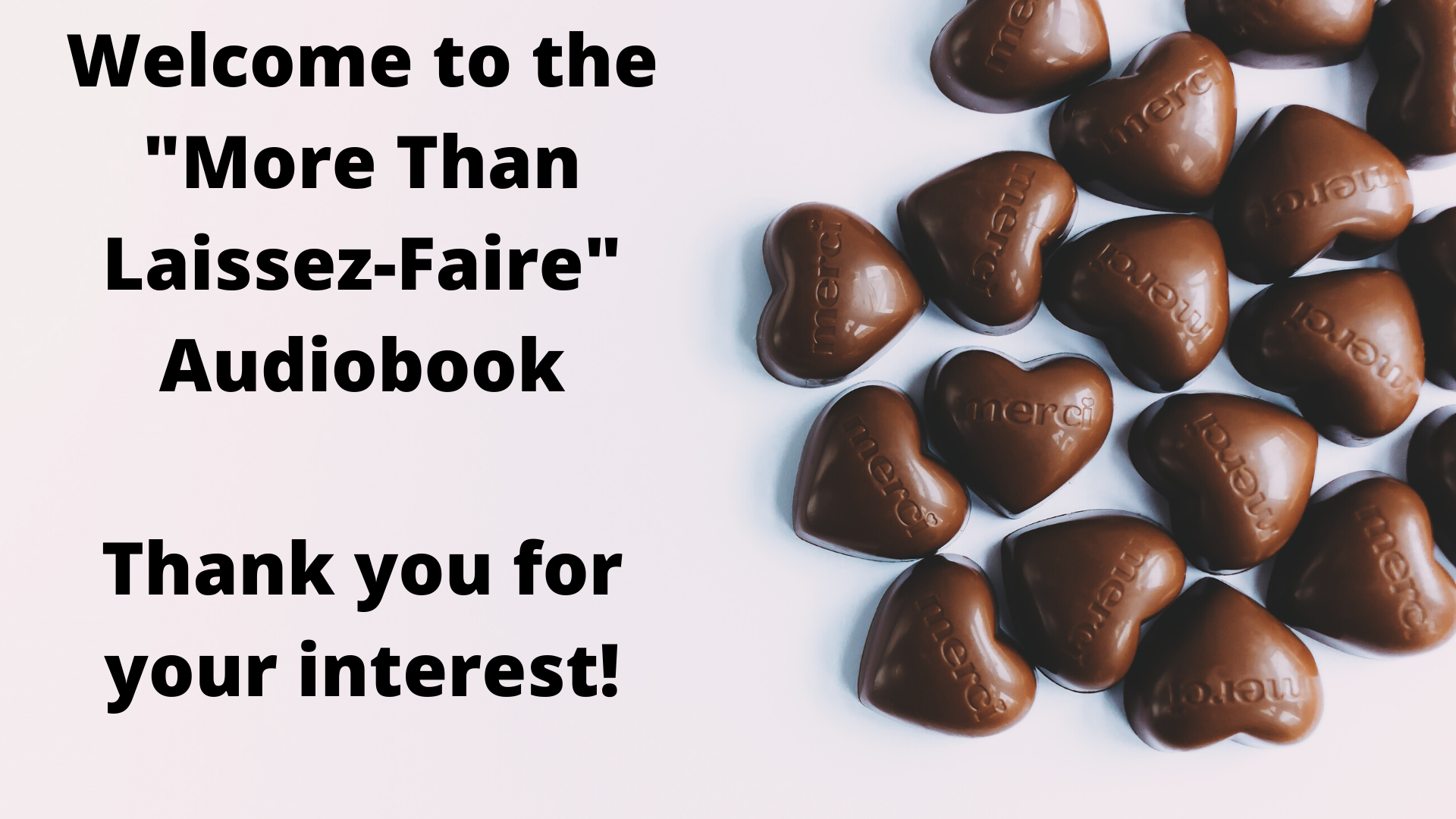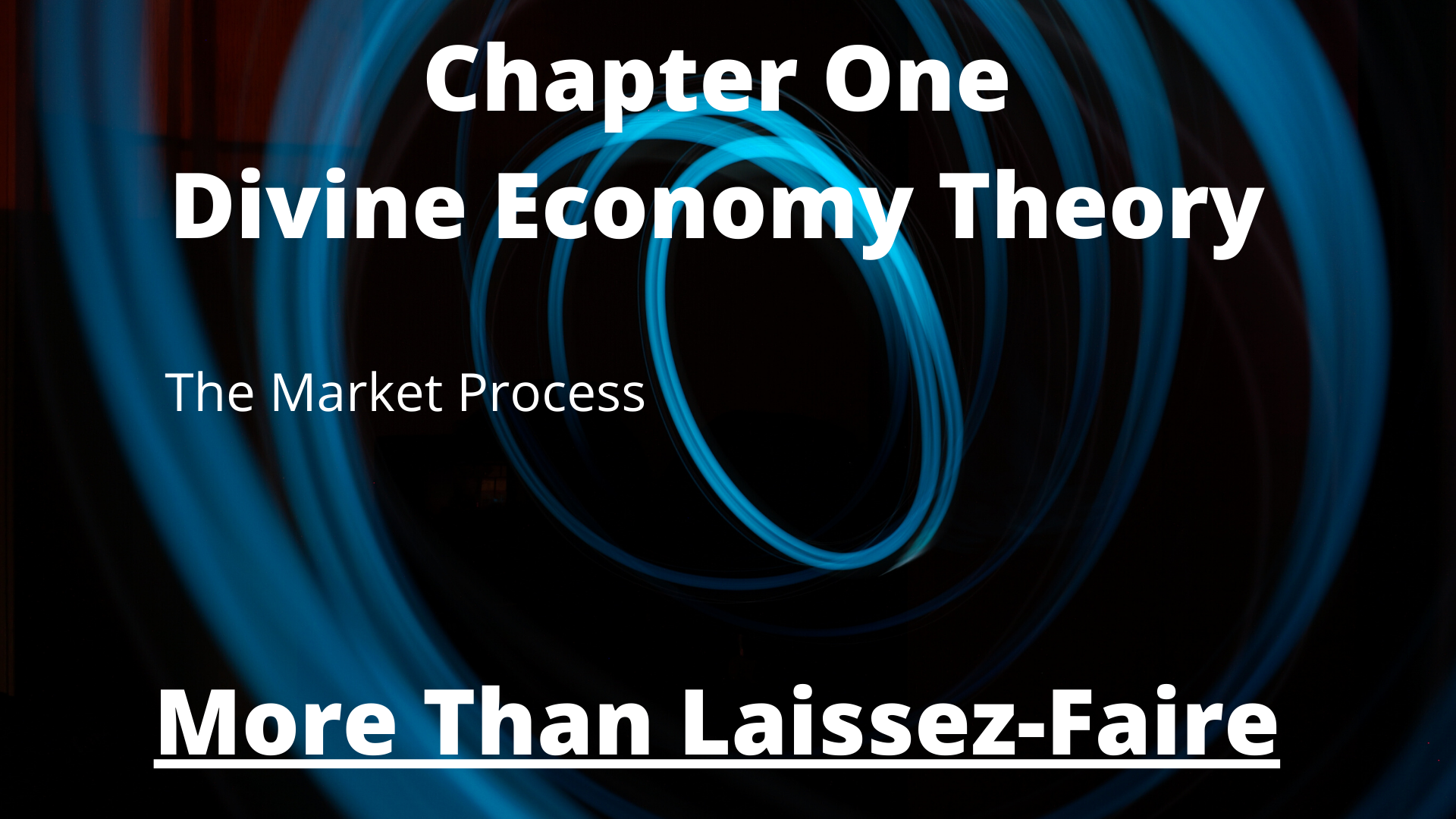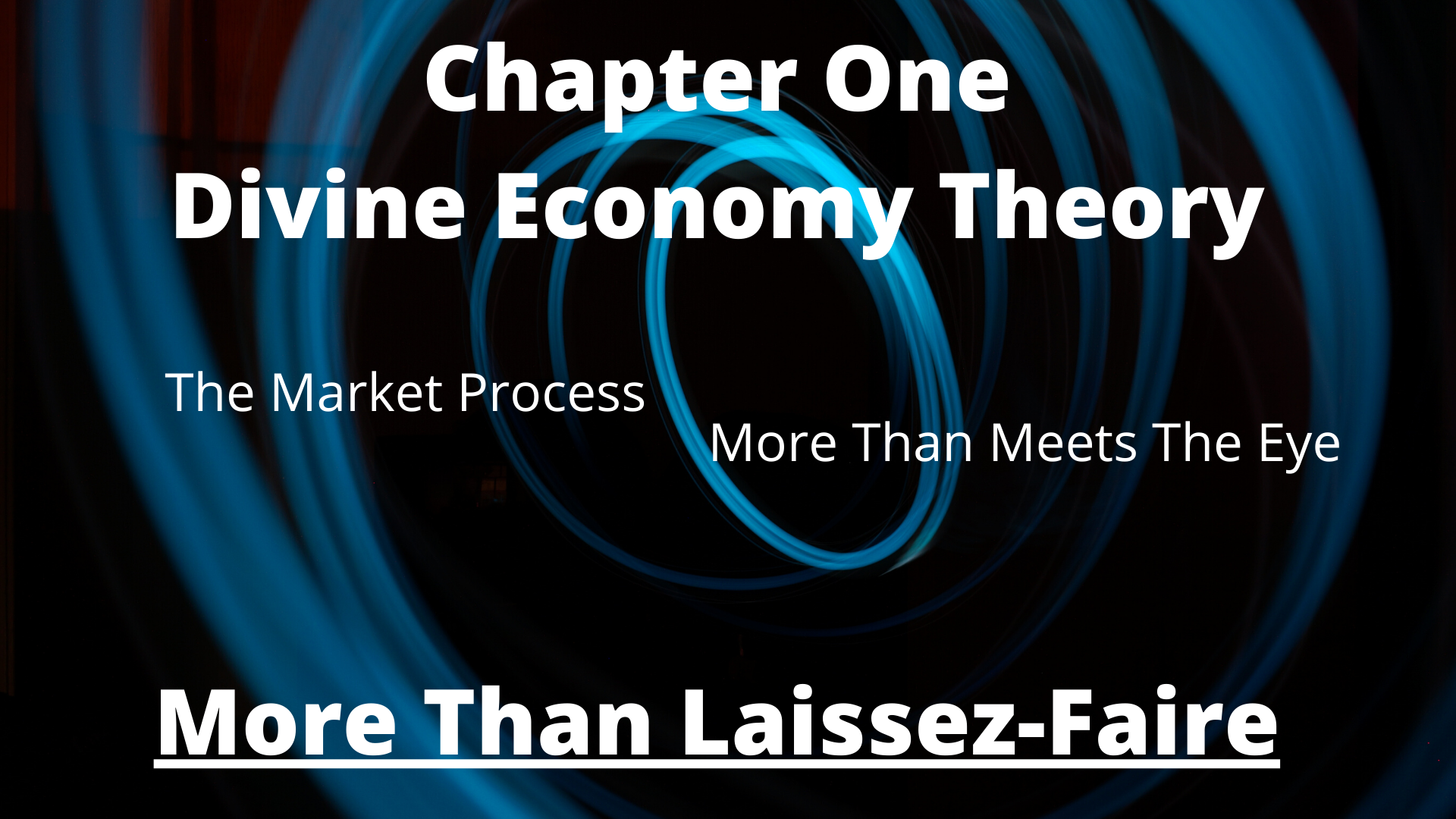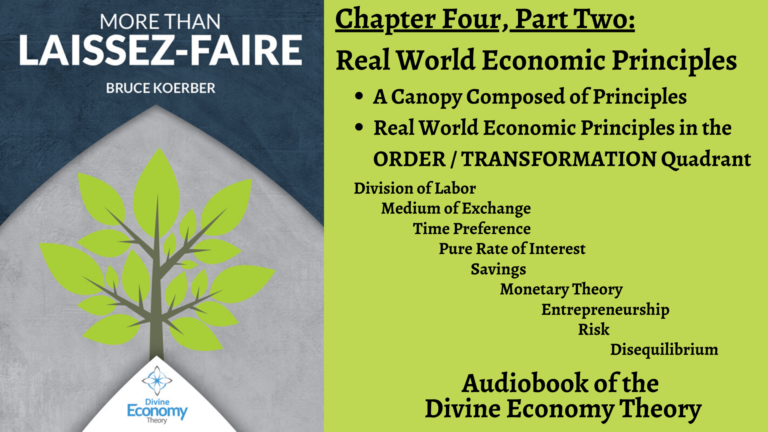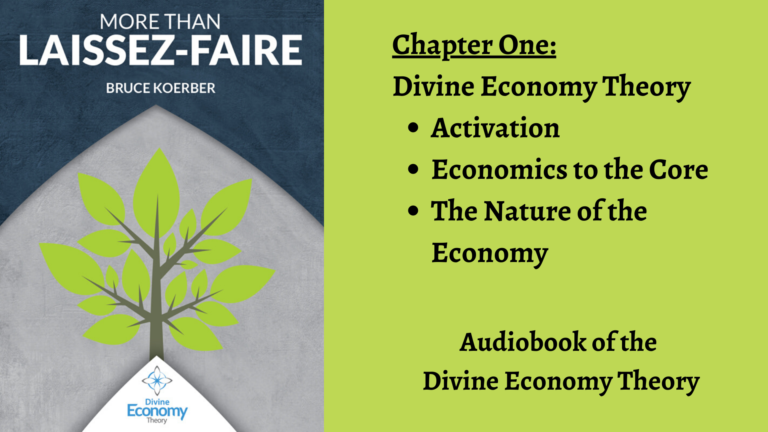Chapter One of this audiobook prepares you for your journey. In it there is an economic identity that will serve you well from this point forward. It is that the market economy is the divine economy and that the divine economy is the market economy. They are one and the same.
Here’s the video recording of this session of the audiobook. Below is the transcript.
You can contact me if you have any questions.
The Market Process
Every exchange takes place in a market which makes clear the point that the word ‘market’ is most certainly universal and almost infinitely broad. As stated with eloquence by Mises:
“Choosing determines all human decisions. In making his choice man chooses not only between various material things and services. All human values are offered for option. All ends and all means, both material and ideal issues, the sublime and the base, the noble and the ignoble, are ranged in a single row and subjected to a decision which picks out one thing and sets aside another. Nothing that men aim at or want to avoid remains outside of this arrangement into a unique scale of gradation and preference. The modern theory of value widens the scientific horizon and enlarges the field of economic studies.”
It is clear then that subjective values are within the realm of economics. When an exchange does occur it is based on the knowledge-at-hand by the actors—the buyer and the seller. The knowledge-at-hand is relative and imperfect, yet at the same time it is fully coordinated within time and space. In other words, it could not be made more perfect as evidenced by the willingness of both the buyer and the seller to consummate the exchange, free of any coercion to do so. That is the market at work.
There are those who object to the imperfect knowledge of the actors, insisting that they would have made a better decision if they had perfect knowledge. This objection is certainly naïve and contrary to the real world. Human beings are neither omniscient nor omnipresent. They cannot grasp all that came before nor do they know the future with certainty. All actors in the economy have only partial knowledge. The “single mind” that has all knowledge does find expression in this new concept of a divine economy. It happens through the instrument (the market) nestled within the divine institution (the economy) bestowed upon mankind. In other words, the unique instrument of human expression that forms as the foundation of economics is the market.
Human planners of the economy are hopeless failures and can be more aptly described as oppressors. In the real economy (the divine economy) there is a ‘central planner’ who is all-knowing and all-seeing and perfectly just. It is God.
God is the creator of the economy as a human institution and His design allows the fullest expression of human diversity. In the divine economy there is decentralized planning to the 𝑛th degree, where 𝑛 represents each individual or business entity that is actively interacting within the market process. The economy changes as the human race changes and yields its promised fruits conditionally—depending upon whether the current state of affairs exists as either a hampered or an unhampered market.
The state of affairs at any point in time reflects the spiritual maturity of mankind and the corresponding condition of the economy. As mankind, as a whole, matures he increasingly cares for himself and for others. The economy always fully serves at the level it is capable of as an institution with divine potential, but unfortunately it has historically been significantly constrained by human intervention.
Like all institutions the economy has the appearance of structure. Its structure in its pure form is the market, free from political intervention. The closer the economy is to a free market the greater its capacity to be a full expression of a divine economy.
Remember that there is interplay between the human actors and the market itself. There is a commingling of these two divine entities and both benefit from this dynamic process of discovery. Also there is a transforming power in this divine encounter. This transforming power is perhaps the most essential element of the divine economy. There is a divine power—the power to transform the resources bestowed upon us into goods and services and which then enables us to serve one another as a tribute to our loving Creator.
More Than Meets the Eye
The divine economy has the power to awaken us to our own potential, which finds expression in service to one another and to our loving Creator. That is why the progress of humanity, even for us as individuals, depends on a free market. Likewise, the discovery of the merits of the divine economy depends on the educative process—significantly derived from the market experience itself—from which proceeds the ever-advancing progress of humanity.
The critical need is to bring all of these processes of the divine
economy into the realm of science. Here the groundwork has already
been laid by the great minds who have described the methodology of
subjectivism and who have expounded upon praxeology—which is the
study and logic of human action. This great scientific heritage pays
tribute to monumental thinkers such as Thomas Aquinas, Carl Menger,
Eugene von Böhm-Bawerk, Ludwig von Mises, Friedrich von Hayek,
and Murray Rothbard. From their work and the work that continues
along these lines there is a scientific foundation that provides the tools
needed to test and to advance the understanding of the processes at work.
Since human beings act purposefully the power to make the divine economy manifest rests with each individual. It rests; it resides, and becomes evident in these individual actions. Mises writes:
“As long as a man lives, he cannot help obeying the cardinal impulse, the élan vital. It is man’s innate nature that he seeks to preserve and to strengthen his life, that he is discontented and aims at removing uneasiness, that he is in search of what may be called happiness.”
The power to make the divine economy manifest comes from the invisible world of thought and reason and enters the visible world through purposeful action. Since no action occurs in a vacuum each action becomes a part of the educative matrix of all actions, all of which follow the same subjective processes and appearing in the market.
What is incredible is how the subjectivist methodology of classical liberalism allows the merging of science and religion. This subjectivist
methodology can be used to discern the essential laws that apply
universally to human beings when they are at the threshold of action, whether that act is an act of faith or a material act. These universal laws
ultimately underlie our quest to know and to understand.
We are educated and we make advancements by the insights gained during our quest for understanding. In the realm of faith our souls progress and our nature becomes more divine. In the material realm we become more tuned in to how our interconnectedness with others can bring prosperity and how we benefit personally from that prosperity.
It is not something that we may even have to consciously make decisions about. It becomes, in a sense, just a realization. This parallels a statement attributed to the British mathematician and metaphysician Alfred North Whitehead, as quoted by Hayek, “Civilization advances by extending the number of important operations which we can perform without thinking about them.” These are the automations that come from the market.
The divine economy is not separable from human civilization, nor is it separable from the advancement of human culture at the ndividual or societal level. The divine economy operates in accordance with the
Will of God and it is a vehicle for the expression of the will of man. The implication of the divine economy is that there are laws and that there is order. The market economy is intimately a part of our lives.
The power within and without the divine economy is beyond our grasp. Yet throughout history men have sought to grasp it. Examples throughout history abound. For the short while and ephemeral period that the power-hungry clutched the economy their illusion of control corrupted them, and the economy became distorted and diverted, leading to the suffering of many both near and distant. Ultimately the destiny of mankind was slowed by their intervention. Quoting Rothbard:
“The hidden order, harmony and efficiency of the voluntary free market, the hidden disorder, conflict and gross inefficiency of coercion and intervention—these are the great truths that economic science, through deductive analysis of self-evident axioms, reveals to us.”
There is only One Being omniscient enough to see all that happens in the market matrix and only One Being that is not wholly dumbfounded by what human minds see as uncertainty. The economy is divine, it is God’s.
The economy provides channels through which the grace and bounty of God flow. According to the divine economy theory, the economy (itself a divine institution) is reciprocally a part of the human operating system. The sooner we learn this and trust this the sooner we can learn how to use this institution to bring about peace and justice.
The divine economy is here for our benefit. It forces us (acting man) non-coercively and by the tendencies of the forces of equilibrium to refine ourselves internally (heart and soul, spirit and intellect), and externally (human and non-human resources). And so it is that the equilibrium forces referred to in this book as the ‘divine economy’ direct our refinement.
I hope you are enjoying your economic journey.
Here’s the video recording of this session of the audiobook.
If you want to be notified at the time when the audiobook is Live on Facebook sign up here.



